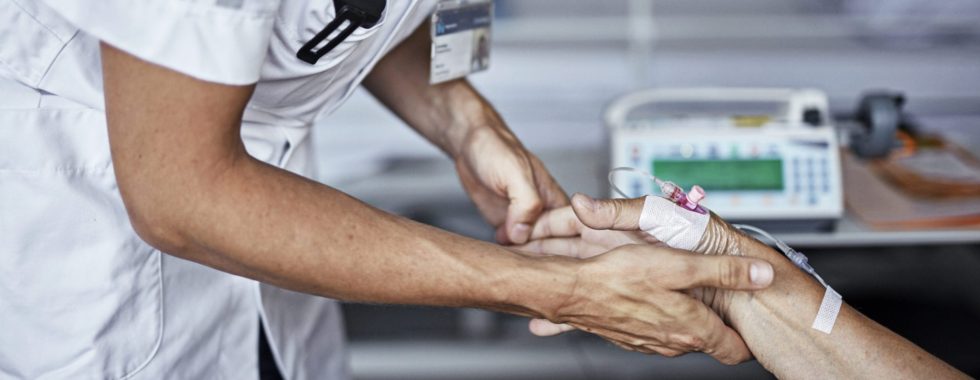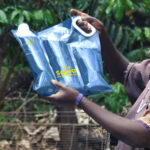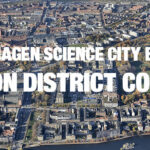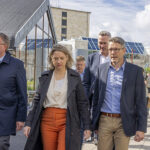First in the world to introduce new immunotherapy
The world’s first trial of new and promising cancer treatment with potential for a major breakthrough within immunotherapy is carried out by Rigshospitalet at the Phase I Unit in Copenhagen Science City.
Danish patients suffering from lymphoma are the first in the world to begin treatment with a promising immunological drug developed by the pharmaceutical company Roche. Expectations are high according to Martin Hutchings, principal investigator and Consultant at the Department of Haematology and the Phase I Unit at Rigshospitalet:
“I couldn’t believe my own eyes when I first saw microfilms of T cells, which in test animals and cell lines targeted, killed and ate tumour cells after the drug had been administered. It looked like the Pac-Man video game from my childhood, with the body’s own T cells in the role of Pac-Man,” said Martin Hutchings.
This is a brand new drug, a type of immunotherapy which, until very recently, had never been given to patients, and only been tested on animals and cell lines. The drug is a so-called bispecific antibody that aims at two types of cell; T cells and sick cells. The job of T cells is to kill any undesirable cells. The antibody brings the T cells into contact with the sick cells, and this activates their killing powers.
A new treatment principle
“We’ve only seen the beginning of what this new treatment principle could lead to. We began treatment of the first two patients in spring 2017, and since then about ten patients have been included in the study worldwide; half of them at Rigshospitalet. The Danish patients come from all over Denmark, and out of 90-110 patients worldwide, the plan is to include 15-20 Danish patients in the trial.
So far, other types of immunotherapy have shown good results by modifying, copying and culturing the patients’ own T cells into billions of cells and injecting them into the blood again to boost the immune system in its fight against the cancer cells. This is a process that takes up to three weeks. However, this new drug is not dependent on multiplication of the patients’ own T cells, but has a direct effect by activating the body’s existing T cells when they come into contact with the antibody. Contrary to other types of T cell therapy (CAR-T and cancer vaccines), this new drug is the same for all patients, so there is no waiting time to have the medicine customised to the individual patient.
“All indications are that this is a particularly potent drug, and that there are good possibilities for combining the drug with others drugs. Both the effect and the adverse reaction profile are completely different from conventional cancer drugs, so we’ve great expectations for this treatment principle as part of future cancer treatment,” said Martin Hutchings.
A pioneer country for cancer trials
The trial in itself is something of a breakthrough for drug testing in Denmark. Only a few times before has an international pharmaceutical company chosen a Danish research department as the first trial centre in a haematological trial to serve as a basis for further clinical development of new cancer medicine. The fact that Rigshospitalet has been chosen is no coincidence, but is part of a positive development welcomed by Martin Hutchings:
“The Phase I Unit has many years of experience in conducting so-called first-in-man trials; i.e. trials in which drugs are given to patients for the first time. However, the fact that we have been chosen as the very first centre to give a new type of medicine is unusual. This shows that we’re an internationally recognised centre for early, experimental cancer treatment not only within oncology but also within haematology. This is also evident from the large number of interesting studies we’re being offered.”
Excellent science with high investment potential
A recent study of research strengths with investments potential in the Greater Copenhagen area, demonstrated that a number of institutions in Copenhagen Science City are in the international elite, where cancer research is concerned. From fundamental understanding of the disease through diagnostics to testing novel therapies.
Great site to work with
Phase one studies of new drugs are demanding. Even more so when the treatment principle is novel. No one can predict how a patient will react to the medicine, so it is important that clinic has a set-up which can manage quick turnaround times, short notice teleconferences and close collaboration with other sites and the science team, says Dorte Klokker, Country Head for Country Clinical Operations Denmark, Roche A/S
“The Phase1 unit at Rigshospitalet offers a full genomic profile for all patients referred and this can help in directing the right patient to the right trial. The staff in the phase I unit is dedicated to managing the early phase studies. These studies are very resource intensive and requires dedicated, experienced and professional staff. Within oncology, we have performed quite a lot of first in man studies at the phase I unit and the past performance is remarkable. This is the first study within hematology and we look forward to continue to work with the phase I unit. They deliver high quality data, are responsible, responsive, and they deliver on their promises”, says Klokker.
Perspectives for more diagnoses
The first studies with these bispecific antibodies aim at haematological cancer diseases such as lymphoma and leukaemia, but the treatment principle has many perspectives, including within oncological cancer diseases with solid tumours.
The phase 1 trial will continue until the second half year for 2018, and more trials with the drug are on the way. If the trials show the expected good results, another five-eight years may still be necessary before the new drug is approved by the European Medicines Agency, the EMA; and is introduced at Danish hospitals.




